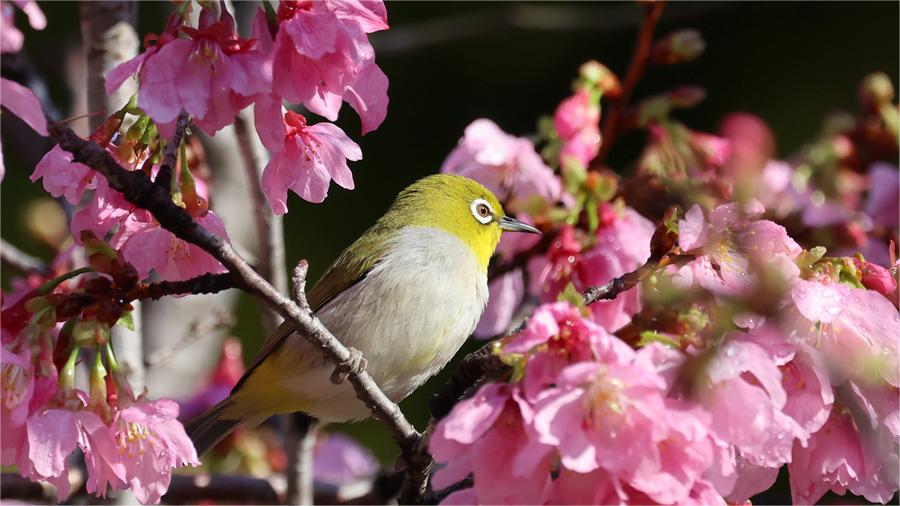Feature: Lung transplant survivor strives to share breath of hope
BEIJING, March 26 (Xinhua) -- For the past decade, Wu Yue, 36, has carefully maintained a delicate balance in her body's immune system, ensuring it's robust enough to combat viruses yet not overly strong to risk rejecting her new organs.
She has undergone two double lung transplants. The first transplant surgery was performed in August 2013, following her diagnosis of a severe lung disease. Five years later, she underwent a second one. Two selfless donors' lungs were successively transplanted into her body, serving as a vital "relay" to sustain her life. She said that every breath she takes is a cherished gift.
Wu leads a cautious lifestyle, requiring daily medication, frequent hospital visits, and avoiding prolonged periods of walking. Despite these challenges, over the years, she has actively assisted individuals with disabilities, registered as an organ and tissue donor, and strived to regain a sense of normalcy in her own life.
She said she hopes to raise awareness among people about how transplant patients regain confidence.
Wu was born in Nanjing, the capital of east China's Jiangsu Province. After graduating from university, she found a job at a local advertising company. In May 2013, she underwent a medical examination due to severe asthma and was diagnosed with advanced lymphangioleiomyomatosis, a rare disease with an incidence of only five cases per million females. The cause of the disease remains unknown and there is currently no cure available. Patients experience persistent breathing difficulties and many eventually succumb to respiratory failure as their condition worsens.
At that time, she required continuous oxygen support. Within just two months, her fingers began to swell, and she experienced difficulty speaking coherently. Doctors informed her that she had only two options: either return home and rely on an oxygen generator for up to five years or undergo a lung transplant.
Fortunately, three months later, a matching organ became available, and she underwent a lung transplant at Wuxi People's Hospital.
After regaining consciousness following the seven-hour-long surgery, she found herself no longer dependent on an oxygen generator and could breathe freely once again.
Wu devoted herself to rehabilitation, pursued new hobbies, such as dancing and baking, and traveled with her parents. She tried to regain the life she once had.
However, the life after the surgery was not plain sailing. Shortly afterward, she lost her job, went through a breakup with her boyfriend, and grappled with the side effects of her medication. At its worst, she had to deal with frequent vomiting every five minutes.
During moments of despair, she thought of writing to the deceased donor of her lungs. She fondly referred to him as the "cattle-grazing boy" because all she knew about him was he grazed cattle thousands of miles away and lost his life in a hillside fall.
In her first letter, Wu shared the joys and blessings, as well as the untold struggles and uncertainties she faced after the surgery. She wrote, "Besides my parents and friends, you are what keeps me going."
To her surprise, when Wu's doctor posted the letter on a microblogging site, it soon received wide media coverage. She never anticipated that her experience would serve as an inspiration for numerous individuals and draw public attention to the donation system.
In 2017, to show her gratitude, Wu registered as an organ donor herself. "Ever since I signed up for organ donation, death has taken on a new meaning for me, helping me discover the significance of my existence and regain the courage to face challenges head-on," Wu said.
The next year, she experienced lung transplant rejection, a significant challenge for transplant patients, with no effective clinical method of mitigation available. Doctors advised another lung transplant. Initially hesitant and blaming herself, Wu eventually agreed after experiencing increasingly severe symptoms.
Following the second surgery, Wu continued to write letters, addressing them to the second lung donor, whom she affectionately called "Buddy 30," in commemoration of the surgery performed on Oct. 30, 2018.
"I wonder if you exchange high-fives in this relay of life. Your love, along with that of the 'cattle-grazing boy' has given me the courage to confront death and encourage more people to join your cause," Wu wrote in her letter.
To ease the financial burden on her family, Wu took up a new job at a cultural startup. She devotes her spare time to learning sign language, providing legal assistance to individuals with hearing impairments, and helping their children with schoolwork. She also serves as an editor at the China Organ Donation Administrative Center, where she is responsible for sharing inspiring stories on social media.
Since Jan. 1, 2015, voluntary organ donation in China has become the sole source for organ transplants following the passing of a citizen. Although the number of potential donors is increasing rapidly, it still falls significantly short. Approximately 300,000 Chinese individuals are currently on waiting lists, yet only 20,000 receive transplants annually.
Wu found that many people around her, both young and old, have registered as donors. She is also delighted to witness the growing societal appreciation for organ donation.
Wu recently completed a 57-day treatment at a hospital. A stage play based on her story will be performed in Nanjing next month. She said she hopes it can foster greater understanding and support for transplant patients.
"I've been through storms, so I am willing to extend my umbrella to those in need," Wu said.
Photos
Related Stories
- Chinese researchers transplant genetically modified pig liver into human body
- Political advisor proposes cross-regional sharing mechanism of organ donation
- China develops brain implant enabling patient to control computer cursor movement
- Construction of China's first domestic medical isotope test reactor starts
- Chinese scientist awarded for groundbreaking work in transplantation, cellular therapy
- China releases management measures for medical emergency response teams
Copyright © 2024 People's Daily Online. All Rights Reserved.









